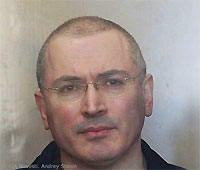Suspicions Grow of 3rd Case Against Khodorkovsky

(Moscow Times – themoscowtimes.com – May 31, 2013) The abrupt flight from Russia of liberal economist Sergei Guriev after he was interrogated in connection with the case against tycoon Mikhail Khodorkovsky has rekindled suspicions that a new criminal case could be opened against Khodorkovsky and his business partner Platon Lebedev, who are set to be freed next year.
Lawyers for Khodorkovsky and Lebedev said they had no information regarding an investigation into a third case against their clients, noting that it would be a serious violation of the law if investigators opened one without informing them.
According to Guriev’s lawyer, he was questioned about a month ago as part of the original case opened in 2003 against Yukos, the oil company that Khodorkovsky led. That case became the basis for all subsequent cases brought against Khodorkovsky, Lebedev and other Yukos employees.
“All I can say is that the investigative group created 10 years ago to implement a reprisal known as the Yukos case still exists, and it continues to open more and more fabricated cases against former Yukos staff, all of which result in convictions,” Khodorkovsky’s lawyer Vadim Klyuvgant said, adding that the activity of investigators had risen significantly in the last 1 1/2 to two years.
Khodorkovky’s lawyers have said that the fact that the first case against him and Lebedev, on fraud and tax evasion charges, was not closed after the opening of the second, on theft and money laundering charges, might be a sign that investigators were gathering evidence for new accusations.
“I can’t imagine what Guriev was interrogated about in connection with the Yukos case. He has never had any relationship to it,” Klyuvgant said, adding that it could “only mean that one could expect new fabrications.”
National media reported that Guriev wrote on Facebook on Wednesday: “It’s better in Paris than in Krasnoarmeisk.” Krasnoarmeisk is a town where Khodorkovsky spent time in prison. Guriev subsequently deleted the post.
Guriev was also questioned about an expert report done as part of the second case to which he contributed for the Kremlin human rights council, after then-President Dmitry Medvedev requested such a report. It was published in 2011 and said Khodorkovsky and Lebedev were innocent.
One of the other contributors to the report, Mikhail Subbotin, said in an interview with Vedomosti on Thursday that five of the six experts were subjected to checks by investigators starting last fall.
An unidentified person with close ties to Yukos told the business daily that the checks signaled investigators’ intention to bring new charges against Khodorkovsky and Lebedev, allowing them to keep the pair in prison instead of seeing them released as planned.
“Someone’s desire not to free them is very strong,” the person said.
A lawyer with government ties told The Moscow Times on condition of anonymity that the unwillingness of law enforcement agencies and those who now own Khodorkovsky’s assets most of which are currently controlled by state oil giant Rosneft influenced President Vladimir Putin’s recent decision to shelve an initiative to grant amnesty to thousands of imprisoned business people.
This is not the first time speculation has surfaced about the possibility of new charges against Khodorkovsky and Lebedev.
Irina Yasina, the former head of Khodorkovsky’s charity Open Russia, said reports appeared from time to time because authorities were aware of the risk of being accused of bias against Khodorkovsky.
“I’m afraid the current rumors could be true,” she said. “The authorities don’t want to free him, because they don’t know how he will act after his release. It’s obvious that he’ll attract the attention of tens of thousands of people, and the government just doesn’t understand that he is not going to take revenge.”
In interviews, Khodorkovsky has said on numerous occasions that, if released, he would not seek to regain the assets he lost after his arrest or to reinstate Yukos. He has also said he would not go into politics.
Even as speculation grows about a third case against Khodorkovsky and Lebedev, the Supreme Court recently announced that in August it would consider a complaint by the pair’s lawyers alleging that their arrest was illegal and challenging the length of their prison sentences.
Khodorkovsky and Lebedev were arrested in 2003 after they were charged with fraud and tax evasion, in what was widely seen as political punishment of Khodorkovsky for challenging Putin’s authority.
The two were tried together again in a second case and convicted in 2010 of stealing oil from Yukos and laundering the proceeds. Last December, Moscow City Court reduced their sentence from 13 to 11 years, meaning they will be released in 2014.
